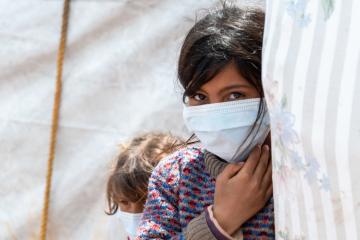Food for vulnerable families
Oxfam’s Anand agrees that the escalating food crisis is a real concern. He says: “The government has announced some food schemes, but they fall woefully short. We have millions of people that were just above the poverty line and now due to the pandemic they have fallen into poverty.”
Mishra says more help is needed and there are gaps in the nutritional food elderly people need to build immunity.
HelpAge is distributing aid packages to 10,000 families across 15 States – about 5,000 of these with DEC funds. Designed with help from the community, the pack includes daily essentials such as rice, pulses, wheat flour, saag, sugar, cooking oil, kitchen masala, an immunity booster, nutritional supplement, and vitamins recommended by the Ministry of Health. Soap and masks are also included to help people protect themselves.
Mishra continues: “In total HelpAge India works with 50,000 vulnerable families, but right now we only have funds to support 10,000 families with these packages, so more funds are desperately needed.”
Preparing for the third wave
With a third wave predicted, Oxfam is working hard on Covid-19 awareness and is supporting 35,000-50,000 frontline workers to help people be prepared. Anand says: “These workers, such as the Accredited Social Health Activist (ASHA) group have a big role to play. They make sure people follow Covid-19 appropriate behaviour, that they know where to go in an emergency, and who will do the referral.
“We are using a variety of other tools. we send texts to large numbers of people in the countryside with messages on how to protect themselves, to why getting vaccinated is very, very important. We use a digital platform, do national television interviews and use loudspeakers mounted atop vehicles to reinforce messages on Covid protection.”
Vaccines
Only 3.6% of the public have now been fully vaccinated in India. This is partly due to a vaccine shortage, an under resourced healthcare system and hesitancy from some, particularly the elderly, to have a vaccine. HelpAge India has produced a poster to communicate about Covid-appropriate behaviour and vaccination protocol. With a free HelpAge India and government helpline people can get advice about vaccines, help getting registered or support to get to a vaccination centre.
Anand concludes: “I can only pray that the third wave is not as devastating as the second. At Oxfam we’re trying to fulfil all requests for medical equipment and supplies, and make sure they reach where they are needed as fast as possible.
“But my biggest concern going forwards is that the food crisis will linger much longer – possibly another one and a half years, maybe even two years. With no jobs anywhere, it's very troubling indeed.”
Donations to the Coronavirus Appeal are now being spent in eight countries, including India, helping vulnerable communities protect themselves against new variants of Covid-19.







